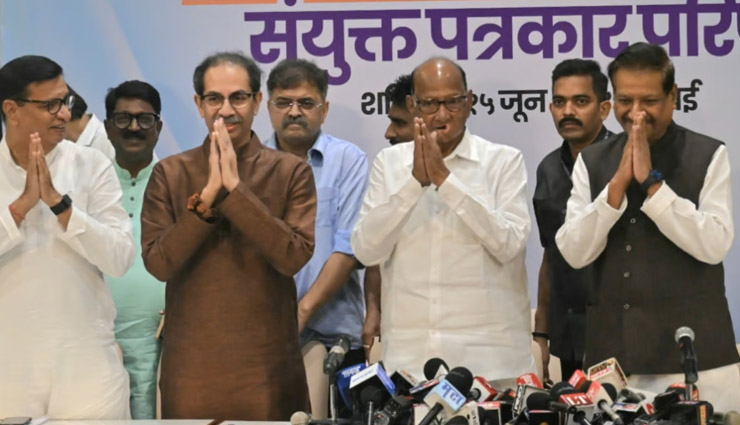Seat-Sharing Dispute: MVA Allies Face Off In Crucial Constituencies
By: Sandeep Gupta Wed, 30 Oct 2024 1:53:06

Senior Maharashtra leaders Sharad Pawar and Uddhav Thackeray's coalition, the Maha Vikas Aghadi (MVA), appears on the brink of collapse. Deep divisions within the coalition have surfaced just before the assembly elections, with all three parties fielding candidates against each other. Observers are now questioning if these parties, unable to sustain their alliance, are fit to manage Maharashtra's governance.
Seat-sharing discussions within the MVA remain unresolved as the deadline for candidate nominations looms. Tensions are especially high between Congress and Uddhav Thackeray's faction, with heated exchanges reported among party leaders. The Congress, in particular, is considering implementing the "Sangli pattern" in various constituencies. Although Sharad Pawar has distanced himself from the infighting, reports suggest that his candidates are also being sidelined in certain areas.
Candidates Stand Opposed Within the Alliance
In an unprecedented move, MVA coalition members are running candidates against each other in key constituencies like Paranda, South Solapur, Deegars, and Miraj. In Deegars, Congress leader Manikrao Thackeray is being challenged by Uddhav Thackeray's ally, Pawan Jaiswal, while in Miraj, the Congress has pitted Mohan Wankhede against Uddhav Thackeray's Tanaji Satpute. In South Solapur, the Congress's Dilip Mane is contesting against Uddhav Thackeray's Amar Patil. Similar clashes are unfolding in the Bhaykhala constituency, where the Congress's Madhu Anna Chavan is standing against Manoj Jamsutkar from the Uddhav Thackeray faction. The situation is further complicated by internal allegations that Sanjay Raut sold seats to the Sharad Pawar group, adding fuel to existing tensions within the coalition.
Despite efforts to appease party members, local leaders within the Congress are reportedly displeased with candidate selections, leading to protests, stone-pelting, and heightened demands for candidate changes. Uddhav Thackeray's faction has also faced issues with misprinted candidate lists, sparking further dissent within both the Congress and Thackeray camps.
Smaller Parties Go It Alone
Traditional MVA allies such as the Peasants and Workers Party and the Samajwadi Party have expressed discontent with seat allocations, feeling marginalized in the seat-sharing process. Samajwadi leaders, including Akhilesh Yadav, have unilaterally announced candidates in constituencies like Malegaon Central and Dhule City, where they hold significant voter sway. Despite the MVA's accusations that the BJP neglects its allies, it appears that the coalition has failed to secure even minimal seats for its smaller partners.
Internal Strife Between Patole and Raut
Amid contentious seat negotiations, Congress President Nana Patole reportedly had a heated exchange with Uddhav Thackeray faction leader Sanjay Raut over the premature push to name Uddhav Thackeray as the chief ministerial candidate. Congress leaders have expressed dismay at this deviation from tradition, emphasizing that announcing a candidate prior to elections is atypical. Former Chief Minister Prithviraj Chavan has even stated that such lobbying threatens the unity of the alliance.
Impact of Haryana Election Results
While MVA leaders were confident following their Lok Sabha performance, the recent Haryana election results have dampened Congress's momentum. Thackeray and Pawar supporters now appear poised to capitalize on Congress's waning influence by positioning their own candidates in key districts. Independent candidates, many with ties to the MVA, have also increased in number, potentially diluting the alliance's voter base.
MVA on Life Support
Although the MVA enjoyed considerable success in the Lok Sabha elections, the assembly race has led to heightened seat demands among alliance members. In Maharashtra, regional parties like AIMIM and the Samajwadi Party are now set to compete, with the Aam Aadmi Party also considering entry in select constituencies. The coalition's instability, fueled by local leadership's aspirations and competing candidates, has left the MVA on precarious footing. While an official breakup is yet to be declared, the alliance's viability remains uncertain as independent candidates enter the fray across Maharashtra.
Alliance Slips Out of Pawar's Control
Sharad Pawar, once a key figure in Maharashtra's governance, now seems unable to control the coalition's diverging interests. Congress's insistence on giving undue weight to allies reportedly led Rahul Gandhi to exit an MVA meeting in protest. With overconfidence taking root among local leaders, several have raised flags of dissent, driven by what critics see as an inflated sense of autonomy.
Mahayuti's Coordination Outshines MVA's Instability
Meanwhile, the Mahayuti alliance led by the BJP demonstrates significantly greater unity. The BJP has strategically allocated local leaders to support the Shiv Sena faction led by Eknath Shinde and Ajit Pawar's NCP group, ensuring that seats remain within the alliance despite member shifts. This level of coordination has positioned the Mahayuti as a formidable opponent, casting doubt on the MVA's ability to present a united front in the upcoming Maharashtra Assembly elections.
Related Stories:





